There’s a common aphorism I see turn up from time to time in conversations in the online role playing game community, “any role playing game is good as long as you have a good Game Master/Good Group.”
In general, it’s a true statement. Some of my favorite role playing game sessions have been with games I thought, and some I still think, are poorly designed mechanically or thematically. The fun was entirely due to having the right combination of Game Master and fellow players. They were able to overcome the limitations of the game by incorporating their own experience, either by coming up with house rules, finding a way to interpret the mechanics in a more interesting way, or by just winging it. I’ve learned a lot about roleplaying game design and about the hobby from these experiences.
Though I’ve found the aphorism to be true most of the time, there are times where it isn’t. No Game Master can make F.A.T.A.L. a fun game, without changing it so much you aren’t actually playing F.A.T.A.L. [Note: If you don’t know what F.A.T.A.L. is, don’t go and look. That is a dark and unrewarding path that will only leave you harmed by the experience.] Similarly, some parody games like Hol weren’t meant to actually be played. Sure, you can probably strap the game into a dentist’s chair and get hard to work to make the game playable, but that kind of misses the point. Hol is commentary on roleplaying game design, and parody, far more than it is an actual game. It’s meant to be read more than it is meant to be played. There are other games where the game itself undermines the experience, but the list isn’t too long and I don’t want to take time to promote them.
What’s often overlooked in conversations about gaming is that sometimes the game itself is good enough to overcome a bad Game Master or Group. Not in the sense that a game can make a particular experience with a bad Game Master or Group enjoyable, though I might argue that can happen too, but that a good game can demonstrate what it is capable of enough to transcend a bad experience. In my experience, I’ve found that Dungeons & Dragons (in EVERY edition) is exactly that kind of game. In fact, I wouldn’t be playing roleplaying games at all if this wasn’t the case.
I was reminded of this point when I saw a Tweet (that’s Twitter Post for the formal) from Cam Banks critiquing what he considers to be a bad faith argument, or at least an uninformed one, many in the table top community have been making lately. He thinks they are rewriting the history of the game and presenting it as something it never was.
I agree with Cam’s general sentiment here and his Tweet reminded me of my very first gaming experience. My first, and second, experience demonstrate that while D&D did in fact have a robust and deadly combat system, that didn’t stop me from having a terrible first game session because I took absolutely zero precautions. Nor did it stop me from having a fantastic time in later sessions even as I continued to take zero precautions and jumped into the chaos that was combat more than ever. The difference was the Dungeon Master and Group and the game surpassed both.
How do I know, well my subsequent experiences of the game were either solo or with a novice DM, and we had a great time. Heck, when I started DMing, I was terrible and my players still had a great time because D&D was good enough to make up for it. I’m getting ahead of myself though.
I was introduced to the Dungeons and Dragons game by my dear friend Sean McPhail. His older brothers had been chatting about this new kind of fantasy game and Sean was pretty excited about it. It didn't take long for me to become as excited about the prospect of putting myself in the place of the great heroes of the fantasy genre. I hadn’t read any of the tales of Conan or Elric yet, but I’d read Edith Hamilton’s Mythology and C.S. Lewis’ The Lion, the Witch, and the Wardrobe. I’d also seen a ton of Harryhausen films, Robin Hood, and Ralph Bakshi’s The Lord of the Rings. Who wouldn’t want to be Aragorn or Gandalf after that?
Eventually a day came along where Sean and I were invited to play in a session of D&D at Sean's house with some of the older "kids." It was very much a Stranger Things moment and it was an eye-opening experience, both positively and negatively.
One thing I remember about the game session is how my imagination ran wild with the possibilities presented and guided my youthful mind to paint the scenes as clearly as if I were watching them on a movie screen. It wasn't that the Game Master provided ample descriptions of the locations, he hadn't, it was that my mind was able to fill in the blanks. Sean and my inclusion in the adventure came unexpectedly and I didn’t own a single D&D book, so I didn't have any of my own characters and had to borrow one of Sean's. He gave me the choice of Aragorn or Gandalf, I chose Gandalf. How could I not? I was going to play the great wizard Gandalf, who I had seen in the movies. He’s totally badass! The fact that Gandalf was a first level Magic User with only one spell didn't affect me at all, nor did the fact that he couldn’t wield a sword.
On the negative side, I remember how poorly the Game Master ran the session. You see, he did the opposite of so many good Game Mastering techniques that the session Sean and I participated in was an almost ideal lesson of what not to do.
First, the game master informed us that he "didn't need the rulebooks" as he had them memorized and that as DM he was "God" and we would have to accept any decision he made regardless of how it represented our understanding of the rules.
Second, the game master didn't need to have any materials to help him run the adventure. He had memorized that as well, or rather he felt that he was perfectly capable of "winging it." He wasn't. Most people aren't unless it is in a collaborative rpg effort like Octane! or The Committee for the Exploration of Mysteries. These games work very well when the players wing it because the world construction is shared and the mechanics work to minimize arbitrary decision making. Or, as is the case with OctaNe!, the rules specifically discuss the disadvantages of arbitrary decision making. "Winged" adventures are more susceptible to capricious/vindictive GM behavior, or the feeling by players of the GM being vindictive and that was very much the case here.
Third, he viewed the game as a competition between the dungeon master and players. For him, the dungeon master "wins" D&D by killing off the players. Combined with the two techniques above, this creates the potential for what is possibly the worst gaming experience imaginable. In this case, much to my inexperienced dismay, it led to a violation of Things We Think About Games maxim #023:
In a tabletop roleplaying game, the characters are all wearing pants.
This is true even though none of the players informed the gamemaster that their characters were putting their pants on.
Issues such as these -- things that any person would do without comment -- are collectively "pants issues," and players in any sane game may always assert that they have done such things if it ever becomes important.
This is a rule that touches on Cam’s point, players didn’t typically have to be overly paranoid about entering combat because they were typically assumed to be “wearing their pants,” or at least their armor as they slept (in early play, armor resource manage came later and if you’ve played Baldur’s Gate you know that it didn’t exist there either).
So what was Gandalf's "pants down" moment? I'm glad you asked.
After some time adventuring a dark and forbidding dungeon, and dispatching some horde of nasties or another, Gandalf, Aragorn, and their friends discovered a chest filled with treasure. Each character fixated on the item most interesting to him/her. For me, I mean Gandalf, that item was a magical scroll containing some arcane mystery. I shouted out immediately, "I read the scroll to see what it is." Thus was my fatal error. Notice that we jumped right into combat and that I jumped right into reading a scroll. There was no attempt to avoid combat/danger.
Never mind that Gandalf had used his one spell. Remember, he only knew one spell as a first level magic user as this was the days before bonus spells for a character's high intelligence. That spell was Magic Missile, in case you were wondering and it damaged but didn’t kill an opponent. In those days, casting Read Magic was a necessary part of deciphering a spell or spellbook. Gandalf hadn't memorized the spell and shouldn't have been able to read the spell. Gandalf, being more cautious of the dangers of untested magic than an 11 year-old, would also not have jumped out of his chair and yelled "I read the scroll!" You see, this particular Gandalf had a high Wisdom score (14 or higher, though I don't know the exact number) -- much higher than 11 year-old me.
Gandalf would have known to take precautions. Never mind the fact that he would also know that he couldn't make anything of the scroll until he rested a day, memorized Read Magic, and only then would he be able to begin the process of unraveling the scroll's mysteries. He would have done those things, but 11 year-old me didn't and was merely excited by the mysteries of magic. The same would be true of me today.
Shortly after yelling out that I wanted to read the scroll, I heard the phrase most 1st and 2nd edition players are loath to hear, "make a saving throw versus petrification/polymorph!"
Uh oh! I didn’t know exactly what those words meant, but I knew they were not good.
Sitting at the far side of the living room, in a shadowy corner far from the prying eyes of the sinister and vindictive dungeon master, I could have pretended to roll dice and replied "I succeed!" Instead, I rolled the die and looked down with horrified eyes as the die roll was far beneath the value necessary to make the saving throw.
"I fail," I murmured meekly to the visiting DM.
"Your character has been turned into an Axe Beak," laughed my nemesis.
"An Axe Beak?!"
"An Axe Beak! Ha, ha! Someone get some rope to make a leash so you don't lose Gandalf."
And so I was punished and mocked for my excitement and wonder. I was too inexperienced a gamer, and too caught up in wanting to "play a story," to think that there were game masters who viewed the game play as a competition and who took pleasure from making players look foolish. I didn't know better than to read the scroll.
But Gandalf would have. He wouldn't, even at first level, have been caught with his "pants down." The DM used a pants issue to hose me and I have resented it ever since.
I wonder how many potential players we have lost through the decades because the person running the game used pants issues to hose the players for their own pleasure.
The funny thing? I may have resented the DM for being a jerk, but that resentment didn’t turn into hatred of D&D nor did it suddenly make me a more cautious player. I remained as foolhardy as ever and I was eager to play again, just not with this DM.
My parents, noting my interest, made an 11 year-old me very happy at Christmas time when Santa brought me a Moldvay/Cook Basic Set, a Fiend Folio, a Deities and Demigods, and a Player's Handbook. The fact that this particular combination of books didn't contain all the rules necessary to run a campaign of my own didn't matter, they contained enough information to light my imagination afire. I am still inspired to play by Tom Moldvay’s introductory words and Bill Willingham’s title page drawing in the Basic Set.
I unwrapped the sword which the mysterious cleric had given me. The sword was golden-tinted steel. Its hilt was set with a rainbow collection of precious gems. I shouted my battle cry and charged.
My charge caught the dragon by surprise. Its titanic jaws snapped shut inches from my face. I swung the golden sword with both
arms. The sword blade bit into the dragon's neck and continued through to the other side. With an earth-shaking crash, the
dragon dropped dead at my feet. The magic sword had saved my life and ended the reign of the dragon-tyrant. The countryside was freed and I could return as a hero.
It was words like these that continued to inspire my imagination, even as the bad DM had almost killed it. But reading through the rules and seeing how genuinely lethal they were, combined with Moldvay’s words, didn’t make me more cautious in play. Instead, they inspired a kind of foolhardiness. A foolhardiness best exhibited by the way I played the game solo as I was teaching myself the rules.
You see, I ended up making scores of characters and put them through the wringer that is Keep on the Borderlands and not in the way you might imagine. I took the scores of characters I made and I played Keep as if it were a strategy wargame and the characters I made were squad members. Some would live and some would die, they were resources who if they survived to 3rd or 5th level would get flushed out with personalities. If they never made it that far? That was fine, they were like individual soldiers in Company of Heroes and just as replaceable.
My first “real” character was named Darg. By the name you can tell he was a fighter. He was one of about 20 or so characters I used in my first solo play through of Keep on the Borderland. He had a 17 Strength (amazing!) and a ridiculously low Wisdom (5) and I expected him to be among the first to die. He didn’t. He lived, gained wealth, and attained greatness. He became a character I role played, but he started as a cipher. The only modern game experience I can use to compare to those early games, and my friends and I continued this way even as we began playing together, is the Dungeon Crawl Classics funnel. That, more than cautious combat avoiders, is how we played. Foolhardy adventurers by the dozen. The game taught us how to play and it exceeded the failures of the bad DM. A good game made up for a bad group.
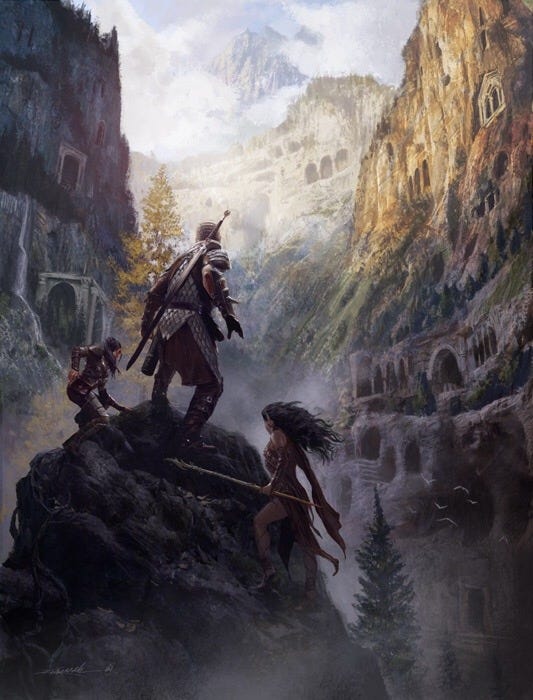
Oh, and those first couple forays into Keep on the Borderlands? They always began the same way, with us attacking the Keep. Our thieves would attempt to climb walls. Our fighters would shoot arrows and bolts at the guards. We were attacking a military bastion, one that we didn’t quite realize was supposed to represent safe haven for other adventures. We knew it was supposed to be our base of operations, but we also played as if it was one that had to be EARNED by conquest. Not once did I worry about whether a character would survive.
That was an afterthought. We let the game decide the story and characters only developed personalities as they achieved things. Characters had to prove themselves worthy of me adopting their persona. I admit it’s not a particularly compassionate view towards the characters, but it wasn’t until Champions and other point build rpgs that we began to create backstories/personas for them during/before creation. Heck, when a character could die during character creation in Traveller.
Many a character died attacking that Keep, but I had a great time and if we took the Keep we were super prepared for the Caves of Chaos.


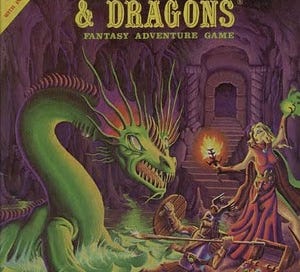



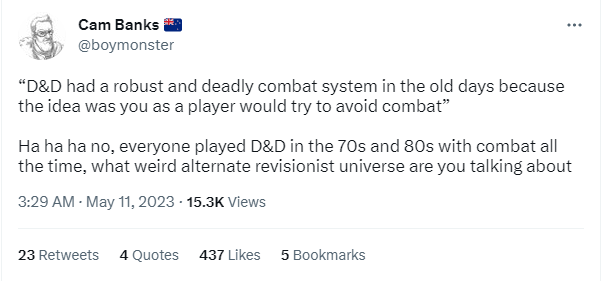
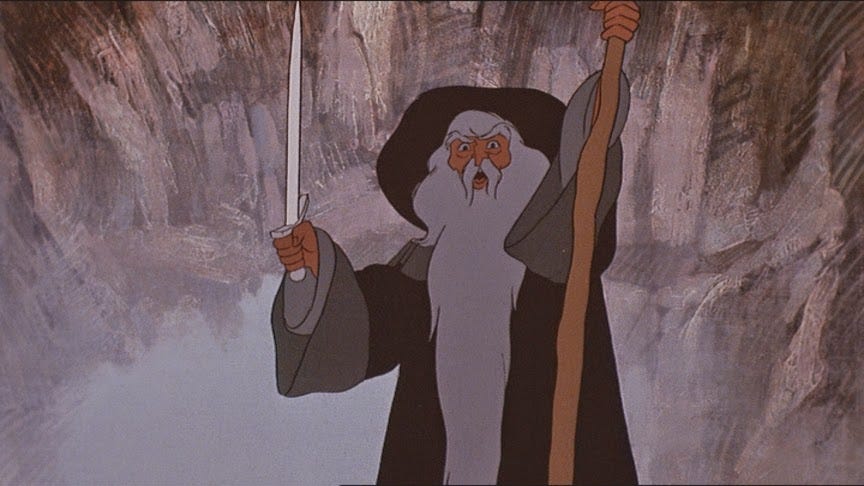

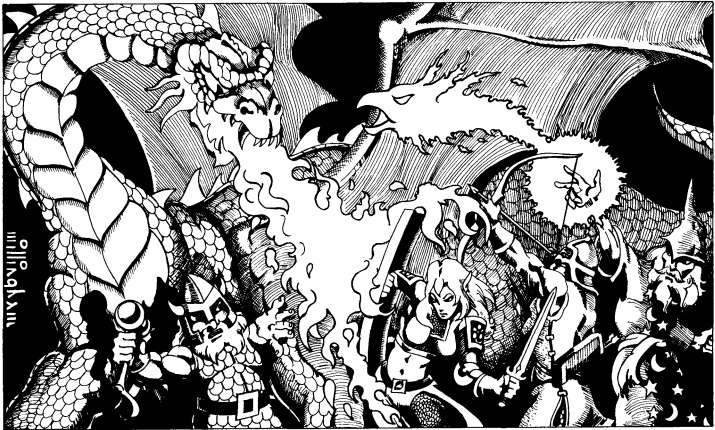
That was awesome . My first time was similar :)
Your first time is always memorable, but never the best lol